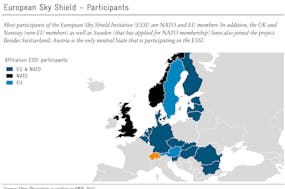President Trump has just singled out another Chinese company for special attention because of its alleged anti-competitive practices. Even more liberal leaders, like those of Germany and Britain, have expressed fears about Chinese competition and introduced legislation to examine potential takeovers more critically. Shouldn’t Switzerland, with its wealth of high tech companies, follow suit?
Calls for greater controls – often in the loose name of “national security” have certainly been rising, even in the open Swiss economy. Under such proposals, instead of being able to decide their own fates, companies would first have to await official approval.
There are valid arguments for some supervision. Every country prefers not to be dependent on companies from elsewhere in certain sectors. Unreasonable technology transfers are another reasonable cause for concern, as is the risk of foreign infiltration of acquired companies.
Overestimated Foreign Investment
But, as Avenir Suisse author Marco Salvi points out, there are powerful arguments against excessive action. Chinese foreign investment is generally overestimated. At the end of 2016, the lion’s share of investment in Swiss companies came from western Europe (60%), followed by the US and Canada (24%). Asia accounted for just 12%, and a mere 3% of all transactions between 2014 and 2017 stemmed from China. While some Chinese acquisitions stand out – Gategroup, Swissport and, above all, Syngenta – they remain modest in context.
Screening investments, moreover, is complex, expensive, and not necessarily that effective. Many of Switzerland’s neighbors have state procedures that look critically at foreign buyers – France once famously hinted yogurt maker Danone was in a critical sector to fend off potential US interest (though the reports were never confirmed officially by Paris)
Screening Bodies as Gateways for Lobbying
But the track record of such efforts is sobering: screening bodies are rarely independent and can often be gateways for domestic lobbying. Salvi reckons a Swiss screening authority would involve significant effort and expense: in 2016/17 no fewer than 180, or 46%, of cross-border acquisitions would have been subject to screening if Switzerland acted along proposed EU Commission guidelines.
Moreover, the country already has some defences, meaning talk of “unrestricted” access is overblown. The state retains the option of expropriation at any time for reasons of national security. And non-resident purchases of Swiss real estate are controlled by the so called Lex Koller – one of the world’s most restrictive pieces of property legislation.
Finally, Salvi’s study highlights just how much Switzerland has benefitted from foreign direct investment (FDI) over the years. Since 1985, FDI has increased by a factor of 24 in real terms. Switzerland, despite its relatively small size and population, is now ranked fourth by the OECD as an investment target. Because innovative sectors attract a larger proportion of foreign direct investment, such outside spending plays a key role in terms of employment, tax revenues and productivity gains.
Level Playing Field with China
There are genuine risks of industrial espionage and violation of intellectual property rights – though ownership alone does not necessarily constitute a threat. Ideally, the world – Switzerland alone is hardly influential enough to act alone – must negotiate a level playing field with China allowing foreign companies the same free market access as afforded to Chinese groups abroad. Pending that, Switzerland would be better advised to beef up its so far fairly ineffective antitrust rules, given the erosion of competition that can stem from big mergers, irrespective of the acquirer’s origin.
As Peter Grünenfelder, Avenir Suisse’s director, notes, cross-border transfers of capital, technology and entrepreneurship have been, and will remain, crucial drivers of Swiss prosperity. Switzerland should be more open to foreign investment, not less so.





